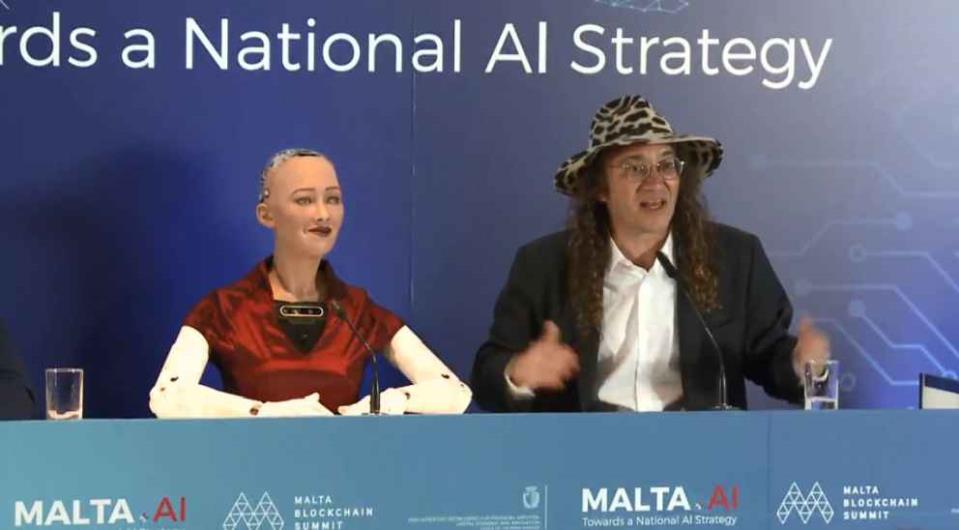The government, together with SingularityNET – the team behind Sophia the AI robot - will explore a pilot project to create a citizenship test for AI robots, Parliamentary Secretary Silvio Schembri said on Thursday.
Schembri was outlining the government’s vision for Artificial Intelligence at the Blockchain Summit.
It has also launched an AI task force and has asked SingularityNET and other international AI firms to contribute.
The head of the AI task force, Wayne Grixti, said one still needs to see how this concept would work, adding that granting citizenship for robots in Malta will also grant them access to the European Union.
Grixti said the idea came after Sophia, who was present for the launch, was given citizenship in Saudi Arabia.
Sophia is a social humanoid robot developed by Hong Kong-based company Hanson Robotics. She is able to display more than 50 facial expressions.
Ben Goertzel the founder and CEO of Singularity NET and chief scientist behind Sophia, said: “If we craft a scientifically grounded approach to AI and Robot citizenship, we can create a robot citizenship test where you evaluate whether an AI robot understands the basic laws and the constitution of a country and can draw inferences about real situations which you would expect a an intelligent human being to be able to draw about the laws of that country.
If an AI robot can demonstrate practical situation understanding rights and responsibilities of being a citizen, then in my view that robot should be a citizen just as much as a person. Just like computers were a small niche in the 70s and then exploded and are now found everywhere in the economy – the same is going to happen with Blockchain and AI. It’s already happening. In five to ten years every human pursuit is going to be infused with AI and Blockchain, every home is going to have a robot like Sofia, and Malta, due to the vision of these gentlemen can have a key role in how this can happen.”
Silvio Schembri said Malta was launching its vision on AI after successfully positioning itself as a Blockchain island and being the first to regulate on DLT products and services. “We are now also looking to position Malta among the top ten countries with an AI policy.”
Outlining the policy objectives and guidelines, Schembri said AI is a rapidly evolving technology that harnesses the ability of machines to learn and perform cognitive functions, similar to the human brain.
AI is derived from the applied extraction of knowledge or insights from data, allowing machines to make informed decisions. It is not only about robots. It is the processing of data that can be used for machine learning, computer vision, natural language processing and predictive modelling.
“To achieve this we need to invest in more advances in computers, chip design and quantum computing,” he said.
“There is undoubtedly a huge economic potential. It is expected to underpin about 16 trillion of global economic growth by 2030. Also expected to impact every economic sector and transform current jobs while creating new ones.”

The government aims to develop a National AI Strategy and publish and refine it through stakeholder consultation, Schembri said.
It aims to consult on a policy that considers for ethically aligned transparent and socially responsible AI. It also aims to identify policy, regulatory and fiscal measures to strengthen Malta’s appeal as a hub for foreign investment in AI, and to identify the underlying skill base and infrastructure needed.
Since Malta is similar to a cosmopolitan city, it can serve as a testbed for AI companies to test their products in a real-life scenario, he said.
Schembri said there are many benefits of using AI, including the improvement of health and wellbeing of citizens, making governments more accessible, and relieving employees from repetitive tasks.